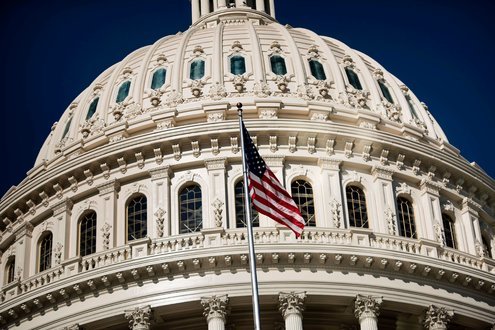“It makes us just as competitive, but it allows us to do the pro-worker reform that we desperately need,” Mr. Rubio said.
Senator Lindsey Graham, Republican of South Carolina, expressed openness to a slightly higher corporate rate than the Senate had proposed.
“Failure is not an option,” Mr. Graham said when asked about raising the corporate tax rate to pay for other changes. “If you’ve got to go up a point or two to make it work, I’m fine with it.”
But the White House was not receptive.
“We do support the child tax credit,” said Raj Shah, a White House spokesman. “We also think that it’s important to make businesses more competitive. We would not support raising the corporate rate as outlined in that amendment.”
In a significant concession, Republicans were planning to sweeten the tax treatment for so-called pass-through businesses by bolstering a tax deduction for owners of those businesses.
But an additional sticking point emerged in the form of how to guard against ballooning budget deficits, with Republicans discussing whether automatic spending cuts could be put in place to ensure that deficits do not soar if the expected economic growth does not materialize.
As negotiations among Republicans continued, Senator Ron Wyden of Oregon, the top Democrat on the Finance Committee, complained that lawmakers did not know what exactly they would be debating.
Advertisement
Continue reading the main story
“There are rumors; there are whispers,” he said shortly before the procedural vote, adding that the bill “seems to have changed practically every half-hour.”
As Republicans negotiate, they are encumbered by parliamentary rules that limit what provisions can be included in the bill. Another restriction: the final bill cannot cost more than $1.5 trillion over 10 years.
Graphic
How Every Senator Voted to Begin Debate on the Tax Bill
The Senate will now begin a period of debate before a final vote on the plan.

The measure’s prospects have nonetheless seemed on the ascent, as reluctant senators speak more positively about the overhaul.
Senate Republicans are using the same procedures to move the tax overhaul through the chamber as they used this summer to try to repeal and replace the Affordable Care Act. In that effort, Republicans succeeded in voting to start debate, just as they did on Wednesday, but they could not ultimately muster the votes to approve a repeal bill.
To pass a tax bill in the Senate, Republicans will need the support of 50 of their 52 members, assuming no Democrats vote for the bill and Vice President Mike Pence breaks a 50-50 tie. The House already passed a tax package that differs substantially from the Senate’s version, so if the Senate can succeed in passing its bill, the two chambers would then need to reconcile the two plans.
Newsletter Sign Up
Continue reading the main story
Thank you for subscribing.
An error has occurred. Please try again later.
You are already subscribed to this email.
But big changes could still be made to the Senate package in the next day or two. The Senate’s debate on the tax overhaul is limited to 20 hours, to be followed by a marathon series of amendment votes known as a vote-a-rama.
Two Republican senators, Ron Johnson of Wisconsin and Steve Daines of Montana, have been unhappy with how the Senate plan treats pass-through businesses, whose profits are distributed to their owners and taxed at individual income tax rates.
The current Senate plan allows pass-through owners to deduct 17.4 percent of business income as a way of lowering their tax rates. But Republicans now plan to lift the deduction to 20 percent, people familiar with the matter said.
Before Wednesday’s vote, Mr. Daines said that he had “seen enough progress to vote yes to move the debate forward,” alluding to the larger deduction.
Advertisement
Continue reading the main story
“There has been some good progress for Main Street businesses in the tax cut bill,” he said. “I was able to secure more than $60 billion in tax cuts for Main Street businesses.”
Then there are Republican senators with concerns about ballooning the national debt, which has topped $20 trillion, a group that includes Bob Corker of Tennessee, Jeff Flake of Arizona and James Lankford of Oklahoma.
Mr. Corker said Tuesday that he had received a commitment for some kind of mechanism to be added to the bill that would raise certain taxes if projected economic growth fell short of expectations. And Mr. Lankford cited the trigger provision as he voiced support for the tax overhaul on Wednesday.
But the mechanics of such a trigger have not been laid out in detail, and some Republican lawmakers have reacted coolly to the proposal. Conservative groups like the Club for Growth and Americans for Tax Reform adamantly oppose the idea, saying it would undercut the economic growth by injecting uncertainty into the tax system.
“Any senator who understands basic business principles and truly cares about the deficit should understand that this trigger is an automatic tax increase and will actually harm economic growth,” said David McIntosh, the president of the Club for Growth.
An alternative approach would be to impose automatic spending cuts in the event that economic growth falls short of projections. Mr. Graham said that some of his colleagues saw cuts to nonmilitary programs as preferable to rolling back the tax cuts if they did not bring sufficient economic growth. He said that Republicans were divided on the idea of a trigger and what it would affect.
Senator John Kennedy, Republican of Louisiana, said he opposed the concept of a trigger, but preferred one that cut spending to one that increased taxes. Senator Bill Cassidy, the other Louisiana Republican, also appeared fond of the idea of using spending cuts as a safeguard in the bill.
“It’s intriguing, isn’t it?” he said.
Continue reading the main story
Article source: https://www.nytimes.com/2017/11/29/us/politics/senate-votes-to-begin-debate-on-tax-overhaul.html?partner=rss&emc=rss
Speak Your Mind
You must be logged in to post a comment.